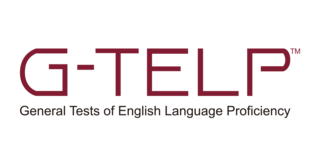Related Research Articles
Test of English as a Foreign Language is a standardized test to measure the English language ability of non-native speakers wishing to enroll in English-speaking universities. The test is accepted by more than 11,000 universities and other institutions in over 190 countries and territories. TOEFL is one of several major English-language tests in the world, others including IELTS, Cambridge Assessment English and Trinity College London exams.

The International English Language Testing System, is an international standardized test of English language proficiency for non-native English language speakers. It is jointly managed by the British Council, IDP: IELTS Australia and Cambridge Assessment English, and was established in 1989. IELTS is one of the major English-language tests in the world.
The Test of English for International Communication (TOEIC) is an international standardized test of English language proficiency for non-native speakers. It is intentionally designed to measure the everyday English skills of people working in an international environment.

The Wonderlic Contemporary Cognitive Ability Test is an assessment used to measure the cognitive ability and problem-solving aptitude of prospective employees for a range of occupations. It is a proprietary assessment created and distributed by Wonderlic. It consists of 50 multiple choice questions to be answered in 12 minutes. The test was created in 1939 by Eldon F. Wonderlic (1909–1980), while he was a graduate student at Northwestern University. The score is calculated as the number of correct answers given in the allotted time. A score of 20 is intended to indicate average intelligence.
The Eiken Test in Practical English Proficiency — informally, Eiken; often called STEP Eiken or the STEP Test — is an English language test conducted by a Japanese public-interest incorporated foundation, the Eiken Foundation of Japan, and backed by the Japanese Ministry of Education, Culture, Sports, Science and Technology (MEXT).
The Versant suite of tests are computerized tests of spoken language available from Pearson PLC. Versant tests were the first fully automated tests of spoken language to use advanced speech processing technology to assess the spoken language skills of non-native speakers. The Versant language suite includes tests of English, Spanish, Dutch, French, and Arabic. Versant technology has also been applied to the assessment of Aviation English, children's oral reading assessment, and adult literacy assessment.
The Test of English Proficiency developed by Seoul National University or TEPS is an English proficiency test created by Seoul National University's Language Education Institute to evaluate South Korean test takers' English language skills. TEPS has been administered nationwide since January 1999. It consists of 200 questions which are divided into four sections: Listening, Grammar, Vocabulary, and Reading. TEPS scores are divided into the ten ratings ranging from 1 + to 5. It is designed to test applicants' communicative English skills and to minimize test-taker reliance on certain strategies such as rote memorization. A study of the test indicated that it is valid and fair.
Language proficiency is the ability of an individual to use language with a level of accuracy that transfers meaning in production and comprehension. There is no singular definition of language proficiency: while certain groups limit its scope to speaking ability, others extend it to cover both productive and receptive language skills and their effective application in varying practical contexts. However, this diversity has implications for its application in other language domains such as literacy, testing, endangered languages, language impairment, etc. There is little consistency as to how different organizations classify it. Native-level fluency is estimated to require a lexicon between 20,000 and 40,000 words, but basic conversational fluency might require as few as 3,000 words.
The Speaking Proficiency English Assessment Kit (SPEAK) is an oral test developed by the Educational Testing Service (ETS). The SPEAK test continues to be administered to non-native English speakers, though it is no longer supported by ETS. No new versions of this test exist. The test aims to evaluate the examinee's proficiency in spoken English; however, most academic institutions recognize that it is limited in that capacity, and have therefore abandoned using it. It is usually taken as a professional certification, especially for graduate teaching assistants in the American college and university system, who are often required to hold office hours and converse in English with students. It is also used in the medical profession, where communication with patients is required. The SPEAK test has been routinely criticized for not accurately testing how a speaker will perform in the real world, in part because it is administered by recording the individual speaking into a recording device rather than speaking to a person. The SPEAK test has also been criticized for using native speaker norms to judge non-native speakers. In fact, independent audits of the SPEAK test conducted in 2012 on some of the few institutions found to still administer this test revealed that the assessment standards provided by ETS were not even being used by the assessors. In fact, in some cases, the assessors of the test were not trained in any way to conduct the assessments, and were found to be assigning arbitrary grades to the candidates. Some of the raters audited were found to themselves have limited functional spoken grammar.
Mute English is a term coined in the People's Republic of China to describe a phenomenon where people cannot speak English well and have a poor listening comprehension as a second language, typically through the traditional method of English language teaching where English is only taught as a subject. The phrase is a calque of the Chinese phrase "哑巴英语". The phenomenon is sometimes referred to as Dumb English.
The English Language Proficiency Test (ELPT) was the name of a SAT II last administered in January 2005. It was a one-hour multiple choice test given on English language proficiency by The College Board. A student whose native language was not English could have chosen to take this test instead of or in addition to Test of English as a Foreign Language (TOEFL) for college entrance depending upon requirements of the schools in which the student was planning to apply. Until 1994, the SAT II's were known as Achievement Tests. The ELPT assessed both the understanding of spoken and written standard American English and the ability to function in a classroom where English is spoken. The test was intended for students whose best language was not English; who attend U.S. high schools, or who had studied in an international school where courses were taught in English; had completed two to four years of English language instruction in an English as a Second Language program or in English enrichment courses; and/or students who spoke a language other than English at home or work. It was scored on a scale of 901 to 999
Language assessment or language testing is a field of study under the umbrella of applied linguistics. Its main focus is the assessment of first, second or other language in the school, college, or university context; assessment of language use in the workplace; and assessment of language in the immigration, citizenship, and asylum contexts. The assessment may include listening, speaking, reading, writing, an integration of two or more of these skills, or other constructs of language ability. Equal weight may be placed on knowledge and proficiency, or greater weight may be given to one aspect or the other.
The Canadian English Language Proficiency Index Program, or CELPIP, is an English language assessment tool which measures listening, reading, writing, and speaking skills. The test is administered by Paragon Testing Enterprises., a subsidiary of the University of British Columbia (UBC). Paragon is the only Canadian company delivering Immigration, Refugees and Citizenship Canada (IRCC) designated English proficiency tests. The CELPIP test is offered in two versions, CELPIP-General, and CELPIP-General LS.
The International Medical Admissions Test (IMAT), is an aptitude test used as part of the admissions process for some Italian universities. These universities offer undergraduate courses that are taught in English and open to applicants outside of Italy. The test has sometimes been incorrectly referred to as the 'Italian Medical Admissions Test'.

The International Test of English Proficiency or iTEP is a language assessment tool that measures the English skills of non-native English speakers. The test is supported by more than 700 institutions including the California State University system. The test is available in more than 40 countries, and is also used by businesses, and governments such as Saudi Arabia, Colombia, and Mexico for large-scale initiatives. There are over 600 iTEP test centers worldwide, with more than 100 in China where iTEP has partnerships with some of the largest education companies in the country.
National English Ability Test, normally called NEAT, is a test of ability to understand and use English. The test was developed in South Korea by the Korea Institute for Curriculum and Evaluation (KICE). It provides for testing in speaking, listening, writing, and reading. The test was developed as an attempt to lessen Korea's dependence on foreign language tests. According to the National Institute for International Education, the total time that the test lasts is 155 minutes. The same organization says the test is to be available in the public sector in 2014, but it is already available for individual taking in 2013. The NEAT organization provides a conversion sheet comparing NEAT scores to TOEIC and TOEFL scores. The test is aimed primarily at evaluating academic preparation. Even though one of NEAT's aims is to get away from "teaching to the test," there are already a number of study books written specifically as NEAT preparation material.
The EF Standard English Test is a standardized test of the English language designed for non-native English speakers. It is the product of EF Education First, a global language training company, and a team of language assessment experts including Lyle Bachman, Mari Pearlman, and Ric Luecht. EF compares the EFSET's accuracy to the most widely used high stakes standardized English tests: TOEFL, IELTS, and Cambridge International Examinations.
The Policy Aptitude Test (PAT) is an offline written test held in India. This test scores a person on the bases of General Knowledge, Numerical Problem Solving, Policy Aptitude, Logical Reasoning, English Language and Policy Analysis Ability. The National Law School of India University, Bengaluru (NLSIU) started this exam and use the test for selecting students for its Public Policy Programme. The test is conducted every year.

General Tests of English Language Proficiency (G-TELP) are English language tests, developed by the International Testing Services Center (ITSC) in 1985. They comprehensively evaluate the practical English use ability of test takers who do not speak English as their native language.